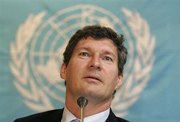 |
|
| Neil-Buhne UN country rep in 2009 |
The Sri Lankan government is demanding the immediate release of a vital UN report on the Vanni war, quoted in the UN Secretary General’s Panel of Experts (PoE) report on accountability issues in Sri Lanka, as the number of deaths due to war contained in the document runs counter to the much publicised claim that over 40,000 people perished in the final stages of the war from Jan to May 2009.
Government sources told The Island yesterday that the UN report, currently being kept under wraps, had placed the number of people killed due to fighting between August 2008 and May 13, 2009 at 7,721 including the LTTE combatants. The UN estimated the number of wounded persons at 18,479.
Government sources claimed that the UN report had contradicted the very basis of the war crimes allegations levelled against Sri Lanka by a section of the international media and some foreign governments, which had chosen to go by uncorroborated media reports and unverifiable PoE statistics.
The UNSG’s panel has made specific reference to what it calls the United Nations Country Team, which carried out the survey in the Vanni region during the war, but it has stopped short of revealing the contents thereof in detail. Although the UN has made available all findings of its Country Team to the PoE, it has not made it public.
The United Nations Country Team has, in preparing the report at issue, based its findings on reliable inputs from the Regional Directors of Health Services, UN and NGO workers operating in the Vanni, the ICRC and religious dignitaries.
The government recently brought the discrepancies between the PoE report and the one prepared by the UN Country Team to the notice of the US. Commenting on a recent visit undertaken by a delegation led by External Affairs Minister, Prof. G. L. Peiris, sources said that the Sri Lankan delegation had taken up the issue at high level meetings in Washington.
Indian medical personnel deployed at Pulmoddai alongside the Sri Lanka Navy had direct access to war wounded evacuated from Puthumathalan after the closure of overland routes to and from the Vanni east due to heavy fighting.
As the ICRC had been involved in the provision of humanitarian assistance throughout the war, the UN could easily verify anything with the ICRC and also the Indian government, whose medics had played an important role in treating the war wounded, sources said.
by Shamindra Ferdinando
IS